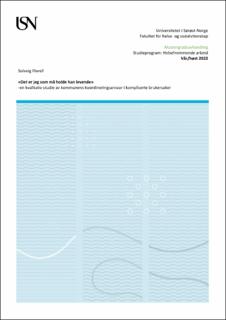| dc.contributor.advisor | Hagen, Susanne | |
| dc.contributor.author | Florell, Solveig | |
| dc.date.accessioned | 2022-08-11T16:42:55Z | |
| dc.date.available | 2022-08-11T16:42:55Z | |
| dc.date.issued | 2022 | |
| dc.identifier | no.usn:wiseflow:6592797:50400803 | |
| dc.identifier.uri | https://hdl.handle.net/11250/3011426 | |
| dc.description.abstract | Bakgrunn Helsefremmende arbeid handler om å gjøre folk i stand til å få kontroll over de faktorer som påvirker helse. En viktig strategi i dette arbeidet er å jobbe på tvers av sektorer og bringe ressurser sammen, for å jevne ut sosial ulikhet i helse. Koordineringsansvarlige i kommunen har som oppgave å koordinere tjenestene rundt brukerne for å skape helhetlige tjenester. Denne studien har til hensikt å undersøke på hvilken måte koordineringsansvaret oppleves for kommunalt ansatte som følger opp komplekse brukersaker.
Metode I undersøkelsen er det brukt kvalitativ metode, med intervjuer av 6 ansatte ved kommunale rus- og psykiskhelsetjenester. Alle ansatte hadde en dobbeltrolle som både koordineringsansvarlig- og oppfølgingsansvarlig. Tilnærmingen til materialet har vært induktiv. I analysearbeidet ble det brukt tematisk tekstanalyse.
Resultat Det er et uklart skille mellom koordineringsansvaret og andre roller i møte brukeren, og man må finne ut av koordineringsrollen selv. Rammene er frie, og kombinasjonen av oppfølgingsrollen og koordineringsrollen oppleves hensiktsmessig. Planmessig arbeid er utfordrende og planverk tilpasses i etterkant av at tiltak er gjennomført. Koordineringsansvaret innebærer å jobbe både strukturelt og faglig. Det er et arbeid som gir en opplevelse av at man er alene. Ansvaret er individualisert og innbyr til fight eller flight-strategier.
Konklusjon Kommunens koordineringsansvar i kompliserte brukersaker innebærer en opplevelse av totalt ansvar. Kombinasjonen av koordineringsrollen og oppfølgingsrollen synes å forsterke denne opplevelsen. | |
| dc.description.abstract | Background Health promotion isthe process of enabling people to increase control over and improve their health. An important strategy is mediate and to work across sectors and bring resources together, to reduce health inequality. The task of a case manager is to coordinate the service for the patients, in order to create holistic services. This study aims to explore how the responsibility is experienced by municipal employees who have the responsibility to care for complex patient cases.
Method This survey is based on a qualitative method, with interviews of 6 employees at mental health services. All employees had a dual role as both case managers and health- and care workers. The approach to the material has been inductive, and in the analyzing process thematic text analysis is used.
Result There is an unclear distinction between the coordination responsibility and other roles in the encounter with the patient, and one must figure out the role on their own. The framework for how to handle the work is free, and the combination of roles is perceived useful. Planning the work is challenging, and plans are adapted after the work has been done. Coordination responsibility involves working both structurally and professionally. It's a job that gives you the experience of being alone. The responsibility is individualized and invites to fight or flight strategies.
Conclusion The case manager’s responsibility entails an experience of total responsibility. The combination of the coordination role and the role of a health- and care worker seems to reinforce this experience. | |
| dc.language | nob | |
| dc.publisher | University of South-Eastern Norway | |
| dc.title | Det jeg som må holde han levende | |
| dc.type | Master thesis | |
